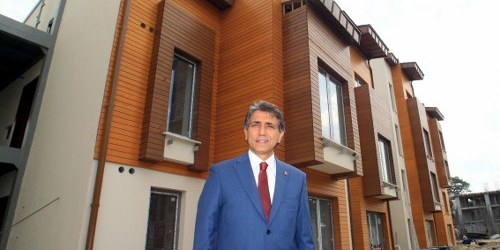Article published by the GUARDIAN
copied from blog reclaimistanbul.wordpress.com

AKP Mayor of Fatih Muncipality Mustafa Demir
in front of new "ottoman-style" houses
Turkish Roma have seen their houses demolished in their former settlement of Sulukule in Istanbul. Photograph: Jonathan Lewiscopied from blog reclaimistanbul.wordpress.com

AKP Mayor of Fatih Muncipality Mustafa Demir
in front of new "ottoman-style" houses
- guardian.co.uk, Wednesday 9 November 2011 18.24 GMT

As property deals go, it leaves a lot to be desired. But then the hundreds of Roma families living in the heart of Istanbul don’t have a lot of choice in the matter.
An “urban regeneration” scheme that turfed thousands of Roma out of their historic settlement in Sulukule is now advertising new townhouses in the district at almost 10 times the price paid to the evictees. The Turkish authorities are being accused of deliberately driving out the Roma in the name of town planning.
The saga began in 2005 when the ruling AKP authorities decided that Sulukule, one of the oldest permanent Roma settlements in the world, and situated in the Istanbul district of Fatih, was to become an Urban Renewal Zone. It was part of a drive to expropriate property in dilapidated areas to boost modernisation – in part for safety reasons, in what is an earthquake-prone part of the world.
The 3,400 Roma living in Sulukule were forced to sell their homes for 500 Turkisl Lira (£175) per sq metre to private investors and the Fatih municipality. Despite worldwide protests, a Unesco warning and court cases to halt the project, forced evictions and demolitions started in 2008. Now surrounded by construction fences, 640 “Ottoman-style” townhouses and offices are springing up on the 22-acre (nine-hectare) site that had housed the local Roma population for over a millennium. The price of the new properties? From TL3,500 to TL 4,500 per sq metre.
“It is clear that none of the former residents will be able to afford a flat here,” said Sükrü Pündük, President of the Sulukule Roma Cultural Development and Solidarity Association, adding that one in four Sulukule residents lives on TL300 per month. “Most people do not have a fixed income, and live from day to day. This was never meant to be a regeneration project, but a project to generate profit, and to force Roma away from the city centre.”
Just outside the construction area Sami Zogun, a former Sulukule resident of more than 40 years, waits for the bus to take him on the one-and-a-half-hour trip to a new development in Tasogluk, a high-rise satellite city constructed on behalf of the public housing development administration, TOKI, roughly 30 miles from the city centre. A single ticket costs TL2.40.
Zogun says that when his friend and landlord sold the 30 sq metre three-storey listed house that he and his wife had inhabited at a modest rent, they moved to Tasogluk, where they must pay TL550 to cover the rent, bills and the commute. His son had to sell his own apartment for the family to afford it.
“If I would have owned that house, I would not have sold them a single needle in it,” he says. “To me, our little wooden house was paradise. The new TOKI houses feel like a golden cage. There is no life there; nothing to do.”
Lorry driver Metin Ates says that he and his family moved back from Tasogluk a year after they left Sulukule. “It was too expensive for us. We just couldn’t make ends meet there.” Once a house owner, Ates was unable to buy another property in the area with the money he received for selling his Sulukule house and now lives in a small flat in a neighbouring district with his wife and three children, paying TL500 a month. “They ruined us. They destroyed our community.”
Like Ates, all but six of the 300 families that moved to Tasogluk in 2008 came back to Sulukule because they were unable to pay the monthly rates, the bills for gas, water and electricity, and the fares for the journey back to Istanbul in order to secure what is a very modest income – Tasogluk did not offer any jobs at all.
Andrew Gardner, Amnesty International’s Turkey researcher, told the Guardian: “Although on paper there is provision for alternative housing in the form of these TOKI houses, we see that the houses which are – on paper – are available to the people displaced from Sulukule are not appropriate, they’re not affordable.”
He added: “The right to housing does not preclude urban regeneration. But it has to be done respecting [the rights] and wishes of the people living in these areas.”
Mücella Yapici of the Istanbul Chamber of Architects says all of Turkey’s urban regeneration schemes are centred on house ownership. “Tenants are never even taken into account, despite them being the most vulnerable,” she said. While the Istanbul average for renting stands between 20% and 30% of households, the number of tenants in Sulukule topped 50%; many residents were simply too poor to afford their own property.
“Homelessness never used to be a serious issue in Istanbul. But the demolitions and evictions led to a dramatic increase of people with nowhere to go. They are not safer, but more vulnerable in the case of a natural disaster,” says Yapici.
“In a way these urban renewal projects which were presented as a remedy to earthquakes cause the same economic and social damage: the forced loss of a person’s home, work, and social ties in a neighbourhood.”
Turkish Roma make way for property developers in historic Istanbul district | World news | The Guardian.
No comments:
Post a Comment